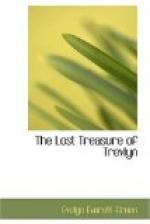The travellers walked on through the twilight and until long after moonrise. They had put a good twelve miles between them and London before they talked of halting. They had no intention of seeking shelter for the night in any wayside hostelry. A hollow tree would give them all the cover they needed, and both had brought with them such supply of provision as would render them independent of chance hospitality for twenty-four hours at least.
Cuthbert’s quick eyes soon sought out the sort of resting place they desired—a great oak, into whose hollowed trunk the dead leaves had drifted, and were now piled up into a soft heap. Lying luxuriously upon this easy couch, the two travellers took such refreshment as each needed; and as Cuthbert saw in the distance before them the bold outlines of the high ground, part of which went by the name of Hammerton Heath, he recounted to his companion his adventure there the November previous, and by what means he had saved his purse from the hands of the robbers.
Culverhouse listened to the story, and when it was done he said:
“Take heed, good Cuthbert, that thou dost not meet with a worse mischance than the loss of thy purse. I would sooner have mine filched from me by freebooters than owe aught to Robert Catesby that could give him any claim upon me.”
Cuthbert looked up quickly. Since that night when he had delivered the papers to Catesby, and had seen and heard so much that was mysterious, he had gradually let the strange incident slip from his memory. Nothing had occurred to recall it, or to render him in any wise uneasy. He had seen nothing of Catesby or his companions. Father Urban had said that they had all dispersed into the country. He himself shortly took leave of the Coles, and was taken off by a boat on a dark night to reach a vessel about to start for Spain. The whole incident seemed more like a dream than a reality now; and Cuthbert’s vague sense of uneasiness had by this time died quite away.
“What dost thou mean?” he asked, as the Viscount’s words fell on his ear.
“No more than this, that yon Catesby is a dangerous man. I know naught against him, save that he is a Papist of the type I like not—a plotting, designing, desperate type, that ofttimes injure themselves far more than they injure others, yet too often drag their friends and those who trust them to destruction with them—and all for some wild and foolish design which they have not the wits to carry through, and against which Heaven itself fights to its overthrow. Have no dealings with this same Catesby, good Cuthbert; thou wilt rue it an thou dost.”
“I am not like to see him again,” answered Cuthbert slowly. “He is gone I know not whither. If men look thus darkly upon him, doubtless he will not adventure himself in London again.”




